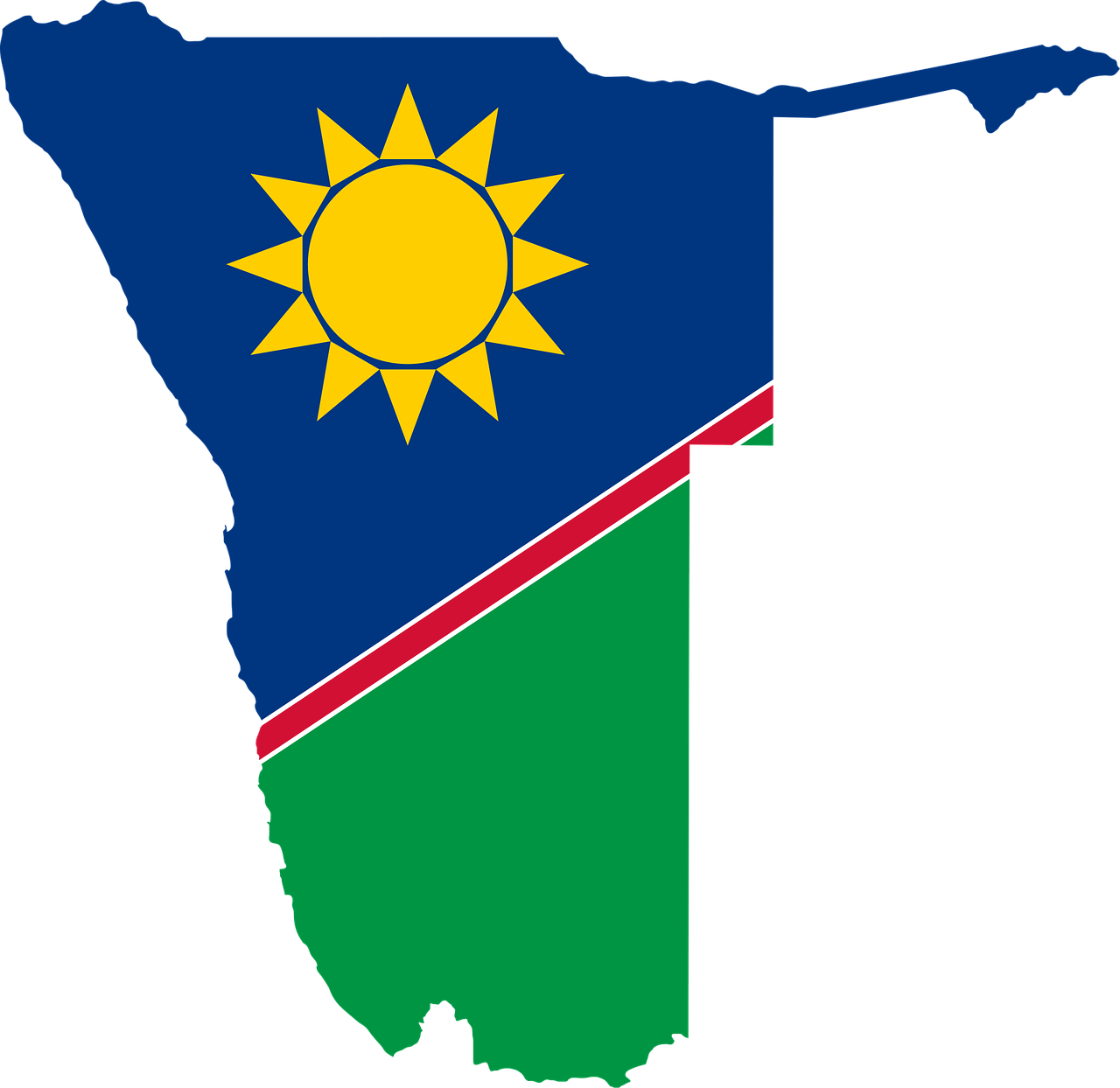Namibia
Overview
Land of the Brave, A Canvas of Contrasts and Opportunities
Situated on the southwestern coast of Africa, Namibia is a land of vast landscapes, from the hauntingly beautiful Namib Desert, with its iconic dunes, to the rugged terrain of the Kaokoveld and the rich biodiversity of the Caprivi Strip. Its Atlantic coastline, known as the Skeleton Coast, tells tales of shipwrecks and explorers, while its inland regions are home to diverse wildlife and ancient cultures.
Windhoek, the capital, is a blend of German colonial architecture, African culture, and modern urban development. It serves as the country's political, cultural, and economic hub, offering a glimpse into Namibia's past and its aspirations for the future.
Namibia's economy is anchored in its rich mineral resources, including diamonds, uranium, and gold. Agriculture, tourism, and fishing are also significant contributors. The government's focus on sustainable development, conservation, and community-based tourism showcases its commitment to preserving the country's natural and cultural heritage.

Culturally, Namibia is home to various ethnic groups, including the Ovambo, Damara, and the Himba, each with its unique traditions, languages, and customs. The nation's commitment to preserving its indigenous cultures is evident in its festivals, art, and community projects.
With its stable political environment, well-developed infrastructure, and emphasis on sustainable growth, Namibia presents a plethora of opportunities for investors and businesses. Its diverse landscapes, rich resources, and strategic location make it a compelling destination for those looking to explore the southern African market.
Key indicators

Population

GDP per capita

Nominal GDP

Purchasing Power Parity GDP

Main export

Foreign direct investment

Stock market capitalization

GDP growth rate
- Economic Snapshot
- Business Environment
- Startup Ecosystem
- Infrastructure & Technology
- Opportunities & Challenges
- Cultural Insights
Namibia is a lower-middle-income country in Southern Africa with a diverse economy. The country is rich in natural resources, including diamonds, uranium, copper, lead, zinc, and gold. Namibia also has a large agricultural sector, with livestock farming and crop production accounting for a significant share of GDP. Tourism is another important sector of the Namibian economy, with the country's unique landscapes and wildlife attracting visitors from all over the world.
The Namibian government is committed to economic growth and development, and is investing heavily in infrastructure, education, and healthcare. The government is also working to improve the business climate and attract foreign investment.
Namibia's economy has been growing steadily in recent years, with a GDP growth rate of 2.5% in 2022
Namibia has a relatively favorable business environment, ranking 104th out of 190 countries in the World Bank's Ease of Doing Business Index. The government has implemented a number of reforms in recent years to streamline the business registration process and reduce the number of days it takes to clear goods through customs. However, there are still some challenges to doing business in Namibia, such as bureaucracy and corruption.
The Namibian government is committed to improving the business environment and attracting foreign investment. The government has launched a number of initiatives to support businesses, including:
- The Namibia Investment Centre: This is a one-stop shop for investors, providing them with information and assistance on the investment process.
- The Namibia Development Corporation: This is a state-owned enterprise that provides financial and technical assistance to businesses.
- The Namibia Chamber of Commerce and Industry: This is the apex body representing businesses in Namibia. It provides advocacy, networking, and other services to businesses.
Namibia's startup ecosystem is still in its early stages of development, but it is growing rapidly. The country has a number of incubators and accelerators, and the government is providing support to startups.
Some of the most promising sectors for startups in Namibia include:
- Fintech: Namibia has a young and tech-savvy population, and there is growing demand for fintech services.
- E-commerce: E-commerce is growing rapidly in Namibia, as more and more people gain access to the internet and smartphones.
- Agriculture: Namibia has a large agricultural sector, and there are a number of opportunities for startups to develop new technologies and services to support the sector.
- Renewable energy: Namibia is investing in renewable energy, and there are a number of opportunities for startups to develop new renewable energy technologies and services.
- Tourism: Namibia is a popular tourist destination, and there are a number of opportunities for startups to develop new tourism products and services.
Namibia has a well-developed infrastructure, including a good road network, telecommunications infrastructure, and energy infrastructure. Namibia also has a high rate of internet penetration (63.3% in 2022).
However, there is still some room for improvement in Namibia's infrastructure, such as in the area of public transportation.
The Namibian government is investing in a number of infrastructure projects, including:
- The Walvis Bay Corridor: This is a transport corridor that links Namibia to the Atlantic Ocean and provides access to regional and global markets.
- The Trans-Kalahari Corridor: This is a transport corridor that links Namibia to Botswana and South Africa.
- The Kudu Gas Project: This is a natural gas project that is expected to boost Namibia's energy supply and support economic growth.
The Namibian government is also investing in technology, including:
- The development of a digital economy: The government is promoting the use of information and communication technologies (ICTs) to improve service delivery and boost economic growth.
- The rollout of 5G mobile networks: The government is working with telecommunications operators to roll out 5G mobile networks across the country.
- The promotion of e-government services: The government is promoting the use of ICTs to deliver government services electronically.
These investments are expected to boost Namibia's economic growth and competitiveness.
Namibia offers a number of opportunities for businesses and investors, including:
- A large and growing population: Namibia has a population of 2.5 million people, with a median age of 23. This young and growing population presents a significant opportunity for businesses in a variety of sectors, such as consumer goods, education, and healthcare.
- Abundant natural resources: Namibia is rich in natural resources, including diamonds, uranium, copper, lead, zinc, and gold. The country also has a large agricultural sector, with livestock farming and crop production accounting for a significant share of GDP. These natural resources provide opportunities for businesses in mining, agriculture, and related industries.
- Strategic location: Namibia is strategically located in Southern Africa, with access to regional and global markets. The country is also a member of the Southern African Development Community (SADC), a regional economic bloc with a combined population of over 350 million people. This strategic location provides opportunities for businesses to export their goods and services to a large and growing market.
- Government support: The Namibian government is committed to economic growth and development, and is providing support to businesses and investors. The government has launched a number of initiatives to improve the business climate and attract foreign investment, such as the Namibia Investment Centre and the Namibia Development Corporation.
However, Namibia also faces a number of challenges, including:
- Poverty and inequality: Namibia is a lower-middle-income country, with a significant proportion of the population living in poverty. This can be a challenge for businesses, as it limits the size of the domestic market.
- Unemployment: Unemployment is a major challenge in Namibia, with over 20% of the population unemployed. This can be a challenge for businesses when recruiting and retaining staff.
- Infrastructure constraints: Namibia's infrastructure is still developing, with some areas lacking access to reliable electricity, water, and transportation. This can be a challenge for businesses, as it can increase costs and reduce efficiency.
Despite these challenges, Namibia offers a number of opportunities for businesses and investors. The country's young and growing population, abundant natural resources, strategic location, and government support make it an attractive destination for foreign investment.
Namibia is a multicultural country with a rich history and heritage. The country is home to over 10 ethnic groups, each with their own unique culture and language. The majority of Namibians are Christian, but there are also significant Muslim and traditional African religious communities.
Namibia is a welcoming and friendly country, with a strong sense of community. Namibians are generally proud of their culture and heritage, and are happy to share it with visitors.
Some specific tips for businesses and investors operating in Namibia include:
- Be respectful of Namibian culture and heritage. This includes being respectful of traditional customs and beliefs.
- Be patient and understanding. Namibians are generally relaxed and easy-going. It is important to be patient and understanding when doing business in Namibia.
- Build relationships. Namibians value personal relationships in business. It is important to build rapport with your Namibian counterparts before getting down to business.
- Be ethical and responsible. Namibians are looking for businesses that are ethical and responsible in their dealings.

Investment Landscape & Opportunities in Namibia

Leading
startups in Namibia
Comming up soon

